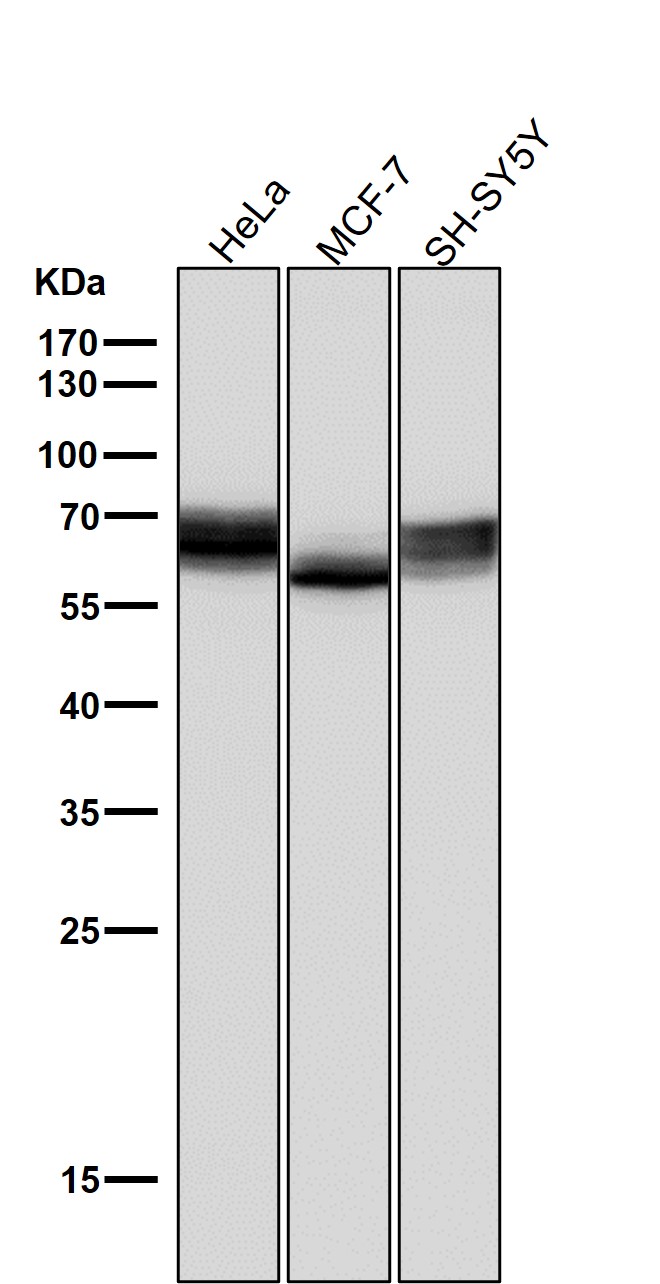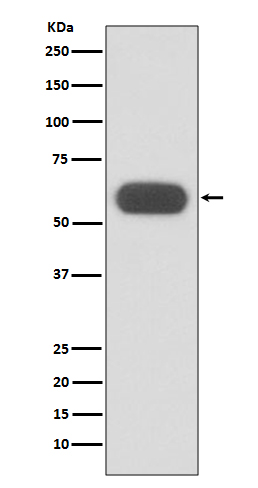


| WB | 咨询技术 | Human,Mouse,Rat |
| IF | 咨询技术 | Human,Mouse,Rat |
| IHC | 1/100-1/200 | Human,Mouse,Rat |
| ICC | 技术咨询 | Human,Mouse,Rat |
| FCM | 咨询技术 | Human,Mouse,Rat |
| Elisa | 咨询技术 | Human,Mouse,Rat |
| Aliases | Alglucerase; betaGC; GBA1; GCase; GCB; GLUC; Glucosylceramidase; Imiglucerase;;Lysosomal acid GCase |
| WB Predicted band size | 60 kDa |
| Host/Isotype | Rabbit IgG |
| Antibody Type | Primary antibody |
| Storage | Store at 4°C short term. Aliquot and store at -20°C long term. Avoid freeze/thaw cycles. |
| Species Reactivity | Human,Rat |
| Immunogen | A synthesized peptide derived from human Lysosomal acid GCase |
| Formulation | Purified antibody in PBS with 0.05% sodium azide,0.05% BSA and 50% glycerol. |
+ +
以下是关于GBA抗体的3篇参考文献及其摘要概括:
---
1. **文献名称**:*Immunogenicity of Recombinant Glucocerebrosidase in Gaucher Disease*
**作者**:Pastores GM, Patel MJ, Firooznia H
**摘要概括**:该研究分析了戈谢病患者在接受重组葡萄糖脑苷脂酶(GBA)替代治疗后的抗体反应,发现部分患者会产生中和抗体,可能影响长期疗效。研究强调了监测抗体水平在临床管理中的重要性。
---
2. **文献名称**:*Anti-GBA Antibodies as a Biomarker in Parkinson’s Disease*
**作者**:Alcalay RN, Hsieh F, Wolf P et al.
**摘要概括**:文章探讨了帕金森病患者血清中抗GBA自身抗体的存在及其与GBA基因突变的关系,提示这类抗体可能参与神经退行性病理过程,或可作为疾病进展的生物标志物。
---
3. **文献名称**:*Development of Monoclonal Antibodies Targeting Glucocerebrosidase for Therapeutic Use*
**作者**:Zhao H, Grabowski GA
**摘要概括**:研究报道了一种靶向GBA的单克隆抗体的开发,验证其结合特异性及在体外增强酶活性的潜力,为戈谢病或相关疾病的抗体疗法提供了新思路。
---
如需更多文献或特定研究方向,可进一步补充说明。
**Background of GBA Antibodies**
GBA antibodies target the enzyme glucocerebrosidase (GBA), a lysosomal protein encoded by the *GBA1* gene. This enzyme hydrolyzes glucocerebroside into glucose and ceramide, playing a critical role in sphingolipid metabolism. Mutations in *GBA1* are linked to Gaucher disease (GD), a lysosomal storage disorder characterized by glucocerebroside accumulation in macrophages. Additionally, *GBA1* variants are a major genetic risk factor for Parkinson’s disease (PD) and dementia with Lewy bodies (DLB), highlighting GBA’s broader role in neurodegeneration.
GBA antibodies are essential tools in research and diagnostics. They enable quantification of GBA protein levels, assessment of enzyme activity, and investigation of pathological mechanisms in GD and neurodegenerative diseases. In GD, antibodies help monitor therapeutic responses to enzyme replacement or substrate reduction therapies. In PD/DLB research, they aid in studying interactions between GBA deficiency, α-synuclein aggregation, and lysosomal dysfunction.
Recent studies also explore autoantibodies against GBA in autoimmune contexts, though their clinical significance remains unclear. Therapeutic antibodies targeting GBA-related pathways, such as those enhancing enzyme stability or cross the blood-brain barrier, are under development for neurodegenerative conditions. Overall, GBA antibodies bridge basic research, diagnostic precision, and therapeutic innovation in metabolic and neurological disorders.
×